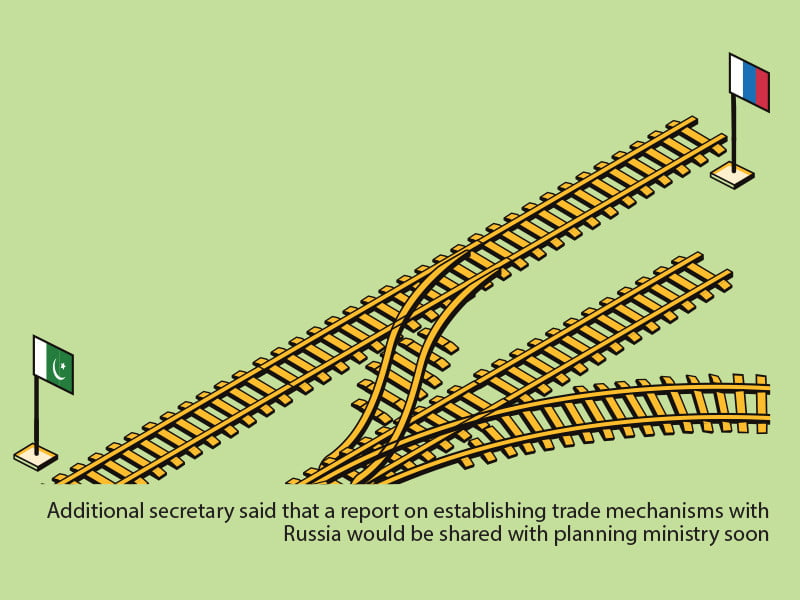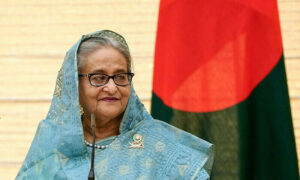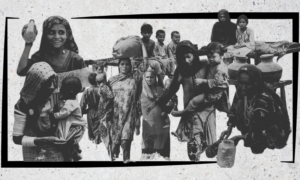ISLAMABAD:
Pakistan has decided to outline a strategic road map to engage with Russia and connect the two nations via railway networks and secure trade routes by circumventing the threat of US sanctions.
Sources revealed to The Express Tribune that Pakistan’s government was developing a three-pronged strategy including government-to-government (G2G) frameworks and projects, business-to-business (B2B) cooperation to foster trade and investment, and mechanisms to ensure safe trade and business operations. The Ministry of Foreign Affairs has endorsed this proposal.
The State Bank of Pakistan (SBP) has cautioned that doing business with Russian entities, which are already under sanctions, could pose challenges. It, however, highlighted that other nations like Turkey were conducting transactions with Russia in local currencies.
During a recent meeting at the Planning Commission, officials of the Ministry of Foreign Affairs stressed the need for adopting viable strategies that could be taken up by a high-powered delegation set to visit Russia soon.
On the occasion, railways secretary outlined three crucial rail routes to build linkages with Russia and Central Asian states.
These include upgrading Quetta-Taftan rail network as a memorandum of understanding (MoU) has already been signed in June 2024. In this regard, a bilateral meeting is expected in the current month to implement the MoU and identify areas of cooperation.
Under the second route, the Kohat-Kharlachi rail network will be connected with Central Asian Republics through Afghanistan following a complete feasibility study.
For the third route, the Minelik Express will connect Reko Diq with Gwadar to gain access to markets of Azerbaijan and Russia. This is a direct and reliable route to the Arabian Sea, significantly reducing the cost of transporting minerals.
The minister for national food security and research and industries and production supported a proposal of the special assistant to the prime minister on foreign affairs to come up with comprehensive plans for holding negotiations with Russia.
They also sought guidance of the SBP on engaging in trade and business with Russia. The central bank clarified that those transactions that did not involve sanctioned entities would not face any issues, though banks would still be cautious due to the sanctions regime and Financial Action Task Force (FATF) compliance concerns.
Minister for Planning, Development and Special Initiatives Ahsan Iqbal highlighted numerous opportunities for enhancing exports to Russia. He also inquired about trade practices followed by Turkey, BRICS bloc and other countries in dealings with Russia.
The State Bank noted that regional banks were trading in their own currencies and coined the idea of exploring a barter trade mechanism to boost ties with Moscow.
Additional secretary (Europe) of the Ministry of Foreign Affairs informed the meeting that a report on establishing trade mechanisms with Russia would be shared with the Ministry of Planning soon.
Planning minister underscored the need for preparing three sets of documents comprising G2G frameworks and projects, B2B cooperation and mechanisms for safe trade and business.
The Ministry of Foreign Affairs recommended aligning the visit of a delegation to Russia with the upcoming Inter-Governmental Commission meeting in September 2024.
At the Planning Commission huddle, discussions also touched upon issues pertaining to Pakistan Steel Mills (PSM). Secretary of the Ministry of Industries and Production mentioned plans to establish an Export Processing Zone on a piece of land of the steel mill, pending final approval.
Meeting participants noted the Sindh government’s intention to build a new steel mill over 700 acres of land and potential collaboration with Russia in the project.
Furthermore, the director general of Power Division suggested that Russian expertise should be leveraged for laying electricity transmission lines for ongoing hydel projects at high altitude and in extreme weather conditions.
Planning minister gave directive for conducting a feasibility study on electricity export to China involving the Three Gorges Dam.
Earlier this month, Russian President Vladimir Putin offered Pakistan increased energy supplies, including crude oil, during a meeting with Prime Minister Shehbaz Sharif in Astana on the sidelines of a Shanghai Cooperation Organisation (SCO) summit.
Putin and Shehbaz were in Kazakhstan for the regional summit and it was their second meeting. Both leaders had previously met in September 2022 in Samarkand on the sidelines of another SCO summit.
Pakistan is keen to develop close relationship with Russia as part of efforts to diversify its foreign policy despite pressure from the West.
In June last year, Pakistan received its first shipment of Russian crude oil under an agreement signed between the two countries.
A cargo carrying 45,000 tonnes of crude oil arrived in Karachi while another 50,000 tonnes reached a week later.







